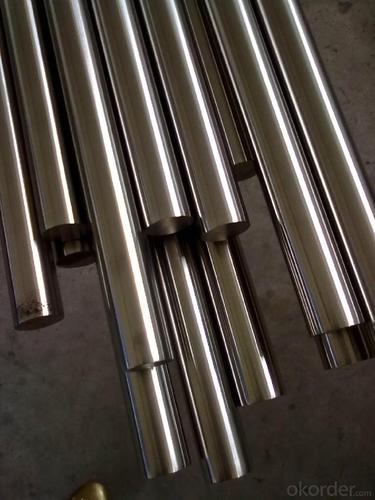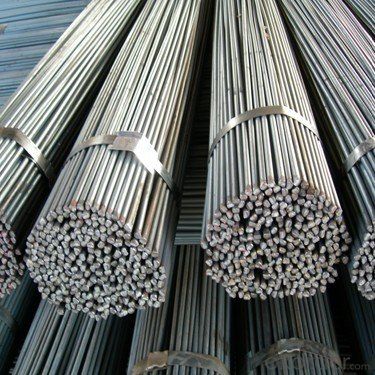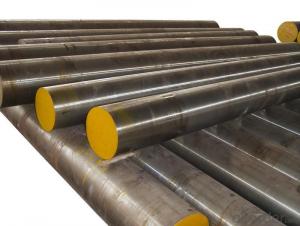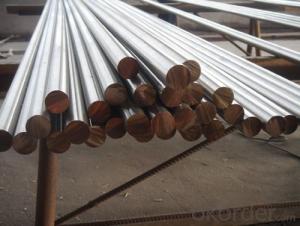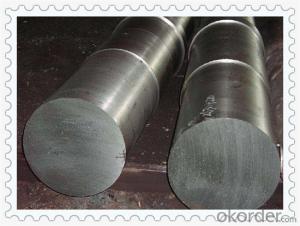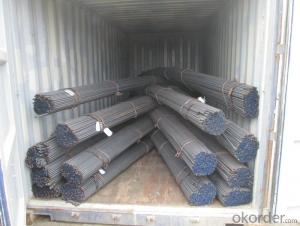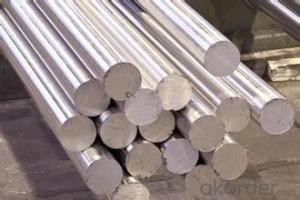ROUND BAR HIGH QUALITY Q235
- Loading Port:
- China Main Port
- Payment Terms:
- TT OR LC
- Min Order Qty:
- -
- Supply Capability:
- -
OKorder Service Pledge
OKorder Financial Service
You Might Also Like
Round bar Details:
| Minimum Order Quantity: | | Unit: | m.t. | Loading Port: | |
| Supply Ability: | | Payment Terms: | | Package: | Bundle |
Product Description:
Wire Rod Q235 Details:
| Minimum Order Quantity: | 25 Tons | Unit: | m.t. | Loading Port: | XINGANG PORT,China |
| Supply Ability: | 100,000 Tons Per Month | Payment Terms: | TT or LC | | |
Product Description:
Specifications of Wire Rod Q235:
Steel Grade: Q235, Standard: GB Diameter: 5.5mm, 6.5mm, 7mm,8mm,9mm,10mm,12mm,14mm
Diameter Tolerance:±0.3mm 6.5mm can be drawing into 2mm/8.0mm can be drawing into 3mm
Brand Name: N-RIVER Place of Origin: Hebei, China Mainland Application: construction, building etc
Chemical Composition:
Please kindly find our chemistry of our material based on Q235 as below for your information
Trademark | Rank | Chemical composition (quality score) % | | ||||
C | Si | Mn | S | P | | ||
| | |||||||
| ≤ |
| ≤ | ≤ | | ||
Q235 | A | 0.14-0.22 | 0.30 | 0.30-0.65 | 0.050 | 0.045 | |
Q235 | B | 0.12-0.20 | 0.30 | 0.30-0.70 | 0.045 | 0.045 | |
Trademark | Rank | Pulling Test | | ||||
Bend PointΔs/Mpa | Tensile Strength | Elongation Ratioδ5% | | ||||
| | |||||||
Thickness (Diameter) /MM | Thickness (Diameter) /MM | | |||||
≤16 | 16-40 | | ≤16 | 16-40 | | ||
≥ | | ≥ | | ||||
Q235 | A | 235 | 225 | 375-500 | 26 | 25 | |
Q235 | B | 235 | 225 | 375-500 | 26 | 25 | |
Usage and Applications of Wire Rod Q235:
After hot-rolled the products shaped into coil and delivery as finished product, including round, square, rectangular, hexagonal and so on. Since most of the products are round, it is generally called wire rod. Carbon steel wire rod is widely used in construction and manufacturing. Carbon steel wire rod is mainly used for reinforcement of reinforced concrete and welded structure or reprocessed (roberts , nail, etc.) materials, especially used to produce wire drawing, welding electrode, nails, spring, electronic, precise machinery parts and so on.
Packaging & Delivery of Wire Rod Q235:
Packaging Detail: products are packed in coil and then shipped by container or bulk vessel
Each coil weight: 2-3MT
Delivery Detail: within 45 days after received deposit or LC.
Label: to be specified by customer, generally, each bundle has 1-2 labels
Trade terms: FOB, CFR, CIF
- Q: What is the difference between a rough turned and a hot rolled steel round bar?
- A rough turned steel round bar is a type of steel bar that has been partially machined to remove imperfections and excess material, leaving a rough surface finish. This process helps to refine the dimensions and shape of the bar, making it more accurate and consistent. On the other hand, a hot rolled steel round bar is a type of steel bar that has been heated to high temperatures and then passed through a series of rollers to achieve the desired shape and size. This process results in a smooth surface finish and provides a uniform grain structure, which enhances the strength and durability of the steel. In summary, the main difference between a rough turned and a hot rolled steel round bar lies in the surface finish and manufacturing process used to produce them.
- Q: How many grades of steel are round steel?
- There are many kinds of steel. They can be divided into three categories: non alloy steel, low alloy steel and alloy steel by chemical composition. Ordinary steels are mostly unalloyed steels. Their quality is divided according to the impurities in the steel, namely ordinary quality carbon steel, high quality carbon steel and special quality carbon steel three kinds. Not by category.
- Q: Can steel round bars be used for making sculptures?
- Yes, steel round bars can be used for making sculptures. Steel is a versatile and durable material that can be easily shaped and manipulated into various forms, making it suitable for sculpting. The round bars can be welded, bent, or cut to create the desired shapes and structures for the sculpture. Additionally, steel's strength and resistance to corrosion make it a long-lasting choice for outdoor sculptures.
- Q: Can steel round bars be used for making turbine blades?
- No, steel round bars cannot be used for making turbine blades. Turbine blades are subjected to high temperatures, extreme forces, and require high levels of durability and flexibility. Steel round bars do not possess the necessary properties to withstand these conditions. Turbine blades are typically made from materials such as titanium alloys or advanced composites that offer high strength-to-weight ratios, excellent fatigue resistance, and thermal stability. These materials are specifically engineered to withstand the demanding conditions of turbine operations, ensuring efficient and reliable performance.
- Q: What are the chemical composition requirements for steel round bars?
- The chemical composition requirements for steel round bars vary depending on the specific grade or type of steel being used. However, in general, steel round bars are typically made from carbon steel, alloy steel, or stainless steel. Carbon steel round bars typically have a chemical composition consisting of iron and carbon, with trace amounts of other elements such as manganese, phosphorus, sulfur, and silicon. The carbon content in carbon steel round bars can range from 0.08% to 2.1%, depending on the desired strength and hardness. These bars are commonly used in construction, manufacturing, and general-purpose applications. Alloy steel round bars contain additional alloying elements such as chromium, nickel, molybdenum, vanadium, and manganese. These elements are added to enhance the mechanical properties of the steel, such as improved strength, hardness, and resistance to wear and corrosion. The specific chemical composition requirements for alloy steel round bars can vary significantly depending on the desired properties and the specific alloy being used. Stainless steel round bars are composed primarily of iron, chromium, and nickel, along with smaller amounts of other elements such as carbon, manganese, and molybdenum. The high chromium content in stainless steel provides excellent corrosion resistance, while the nickel content enhances its strength and ductility. The chemical composition requirements for stainless steel round bars are typically specified by international standards such as ASTM or EN, which outline the minimum and maximum allowable percentages of each element. In summary, the chemical composition requirements for steel round bars depend on the specific grade or type of steel being used, with carbon steel, alloy steel, and stainless steel being the most common types. The composition of these bars is carefully controlled to achieve the desired mechanical properties and performance characteristics for various applications.
- Q: Are steel round bars suitable for construction applications?
- Yes, steel round bars are a great option for construction purposes. They are widely utilized in the construction field because of their robustness, longevity, and adaptability. These bars offer exceptional support to structures and are commonly employed in the construction of buildings, bridges, and infrastructure projects. Steel round bars have the ability to endure heavy loads and provide stability, making them suitable for a variety of construction applications. Furthermore, they can be effortlessly manipulated, cut, and joined together through welding to meet specific project requirements. Their resistance to corrosion also makes them ideal for both indoor and outdoor construction projects. Overall, steel round bars are an optimal choice for construction endeavors due to their strength, durability, versatility, and user-friendly nature.
- Q: What is the difference between a solid and a hollow steel round bar?
- The main difference between a solid and a hollow steel round bar lies in their construction. A solid steel round bar is made entirely of solid steel material throughout its entire length. On the other hand, a hollow steel round bar has a hollow center, creating a tube-like structure. This design reduces the weight of the bar while maintaining its strength. Solid round bars are often used when high strength and durability are required, while hollow round bars are commonly used in applications where weight reduction is a priority, such as in construction or engineering projects.
- Q: Can steel round bars be used in the chemical industry?
- Yes, steel round bars can be used in the chemical industry. Steel is often preferred in the chemical industry due to its high strength and durability. Steel round bars are commonly used for construction of storage tanks, pipelines, and equipment in chemical plants. The material's resistance to corrosion makes it suitable for handling various types of chemicals, acids, and alkalis. Steel round bars also provide excellent structural support, which is crucial in maintaining the integrity and safety of chemical processes. Overall, steel round bars are a reliable and widely used material in the chemical industry.
- Q: Are steel round bars suitable for bridge construction applications?
- Yes, steel round bars are suitable for bridge construction applications. Steel is known for its strength, durability, and versatility, making it an ideal material for bridge construction. Steel round bars provide excellent structural support and can withstand heavy loads and harsh environmental conditions. Additionally, steel round bars can be easily fabricated and customized to meet specific bridge design requirements.
- Q: What is the difference between gcr12 round bar and Cr12 round bar? Can it be used in general?
- GCr12 is the bearing steel, belongs to the high carbon chromium bearing steel, the chromium Cr content is about 1.2%, other alloy element's indication method and the alloy structural steel alloy content is same. The utility model is mainly used as a ferrule and a rolling body of a rolling bearing under general service conditions.
Send your message to us
ROUND BAR HIGH QUALITY Q235
- Loading Port:
- China Main Port
- Payment Terms:
- TT OR LC
- Min Order Qty:
- -
- Supply Capability:
- -
OKorder Service Pledge
OKorder Financial Service
Similar products
Hot products
Hot Searches
Related keywords



